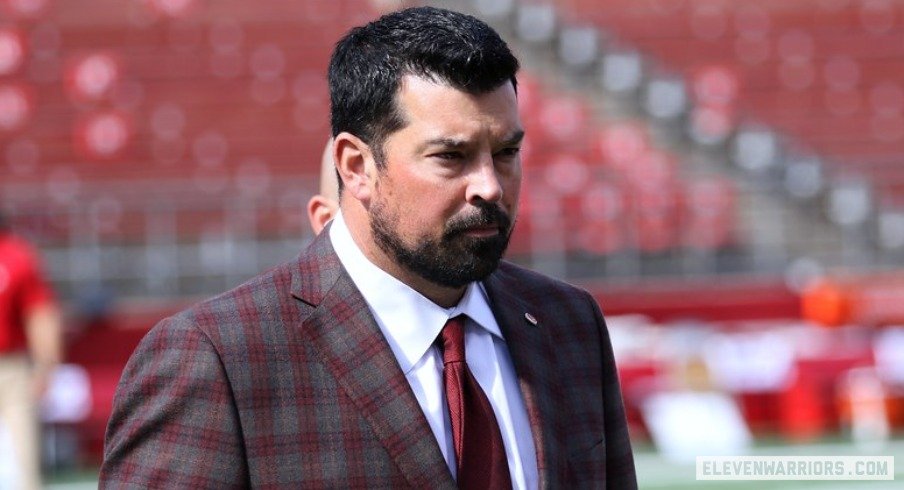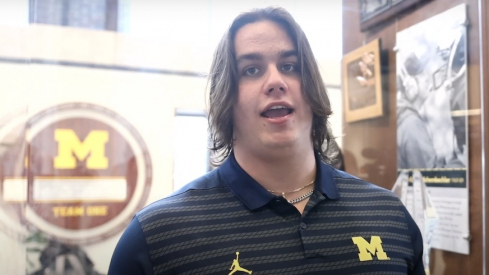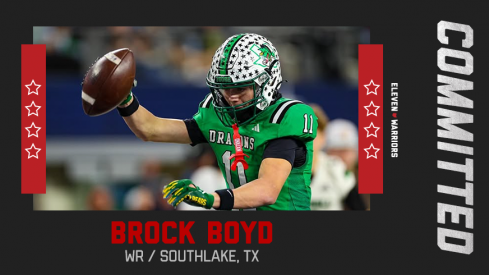Ryan Day has some concerns about the current state of college football.
While name, image and likeness benefits and the one-time transfer rule have both been in effect since at least July, their joint impact on college athletics has never been more apparent than in the past few weeks. Player mobility is at an all-time high in the sport since the end of the regular season, and it’s no secret the two rule changes in question are the main reason why.
With four Buckeyes entering the transfer portal since Nov. 27, two others doing so in the middle of the season and a class of 2022 commit flipping to Texas on Early Signing Day, it's safe to say Ohio State has felt the impact just like any other program across the country.
“To say that I’m not, at the very least, concerned about what’s going on right now across the country, that wouldn’t be accurate,” Day said at a press conference Wednesday. “There’s just a lot with it. But I will say that I think now more than ever, the focus has to be on relationships in this recruiting process.”
Most notable among recent Buckeye transfers is five-star recruit and top-rated quarterback prospect Quinn Ewers, who left the program just a few months after reclassifying into the 2021 cycle to join Ohio State a year early. Before Ewers had the chance to throw a pass in a Buckeye uniform, let alone finish a semester of classes at Ohio State, he had already decided his future would not be in scarlet and gray.
Ewers, a native of Southlake, Texas, announced he’d be transferring to Texas to join Steve Sarkisian and the Longhorn program this past Sunday.
“Somebody on our team could say that they’re coming and leave tomorrow too. This is just a start, and it’s just a starting point, because we’ve already had somebody that we thought was gonna be in this class come and leave,” said Day, in reference to Ewers. “So it’s something that we have to be able to adapt to and adjust to and try to do the best we can along the way to communicate and build those relationships, but it’s certainly very, very new, and it’s moving very fast.”
Two days after Ewers informed the Buckeyes he entered the transfer portal, Day told members of the media he was “caught off-guard” by the true freshman’s decision. But given the NIL opportunities rolling in for Ewers as a backup quarterback – and even before arriving on campus at Ohio State, for that matter – it was clear that a chance to get on the field quicker could only accelerate his earning potential.
In Day’s eyes, the fact that neither the coaching staff nor the university has any say in the NIL deals its athletes enter into is worrisome.
“It’s very complicated. And for the sport itself, I think the concerning part is that the coaches can’t set that up,” Day said. “The coaches and Ohio State is not allowed to set those type of deals up, that has to come from outside the university. And now you are counting on, and people are influencing these kids, who are outside the university. And I think, again, that’s concerning. Sometimes you can look at it and you can say to yourself, ‘What really are the rules here, other than the fact that the coaches and school can’t set up the deals?’”
But Day doesn’t deny that the platform and brand of Ohio State puts its student-athletes in position to land NIL opportunities that may not be possible at other universities.
“Ohio State and our guys have benefited tremendously from NIL. There’s been a lot of opportunities for our guys, and they’ve really capitalized on that,” Day said. “However, the understanding of something coming in on the front end is something that we cannot be a part of, and so the integrity of this school and how we do things is gonna be important for us. And it always has been.”
In what has been widely touted as the biggest college football recruiting shock in recent memory, the nation’s No. 1 recruit (five-star cornerback Travis Hunter) flipped from Florida State to Deion Sanders’ Jackson State program on Early Signing Day Wednesday. The dust has yet to settle on what role NIL may have played in that decision, but given Sanders’ connections to Barstool Sports, speculation is already well underway.
Deion Sanders flipping Travis Hunter, the nation's No. 1 recruit (and a CB no less) from his alma mater, FSU to join him at an HBCU, Jackson State would unquestionably become the biggest signing day stunner in my 20-plus years of covering this stuff.
— Bruce Feldman (@BruceFeldmanCFB) December 15, 2021
Source close to program tells me rumors of an NIL deal between Travis Hunter and Barstool are not true.
— Khari Thompson (@_KhariThompson) December 15, 2021
Day did not accuse other programs across the country of doing anything outside the rulebook, but did say the gray areas in the rapidly evolving world of NIL are a bit unsettling.
“I don’t think there’s anything against the rules. The rule is guys can make money, NIL, outside of the university,” Day said. “But the deals that are being made really have nothing to do with the university itself and the coaches and the administrators are not allowed to set those deals up. So it’s kind of out of our hands, which is concerning.
“There’s only so much Ohio State can do. We’re not allowed to set up the deals. I think we’re doing everything we can to make sure we provide the structure, the resources that these guys need in order to have what they need to help with the deals, but we’re not allowed to set them up, so there’s only so much we can do. That’s maybe what my point was earlier. That’s out of our hands, and we’re not gonna get into that, because that’s not legal. That’s where I think it gets a little messy at times.”
Day and the Buckeyes had a commit of their own flip to a different school on Early Signing Day, as four-star cornerback Terrance Brooks – the No. 59 overall prospect in the country – announced Wednesday he would instead be joining Ewers and company at Texas in 2022. Just like with Ewers, Day said the situation “caught us off-guard, for sure” and added that Brooks’ decision was especially disappointing because “there wasn’t any conversation that it would happen like this.”
Whether in the case of a recruit that has yet to sign with the Buckeyes, a player that has been on campus for a few months or a veteran in the program that decides to transfer, Day said the proliferation of such decisions have made him reevaluate his approach to recruiting altogether.
“You don’t just talk somebody into coming to your school anymore. You tell them all the reasons why, but they have to want to be there,” Day said. “And then when those bad days come, those tough days come, and someone back home or someone’s telling them, ‘Oh, you need to go transfer to this school,’ they say, ‘No, I got this. I chose this school for a reason. I chose this school, no one talked me into coming here.’
“Because when that happens, they just knock on the door and say, ‘Coach, I’m gonna enter the portal.’ And then what do you do? All the time that you had, all the investment that you made in that person – you think about all the time and energy and resources that we spend on recruiting and on one individual family – for them to walk out the door, man that’s a bad day no matter how it works.”
To call roster management in the modern era of college football a moving target, Day said, would be an understatement. The Buckeye head coach said it’s “unlike anything that’s happened before in college sports,” and used both high school athletics and the NFL to illustrate his point that only in college football can a player “just change teams whenever they want to.”
Of course, the Buckeyes have benefitted from the transfer portal in recent years as well, with players like Justin Fields, Trey Sermon, Jonah Jackson and Noah Ruggles all enjoying great success with the program in the last three seasons alone after transferring out of their previous schools.
But that doesn’t mean Day will look to speed up the frequency with which he adds new transfers to the fold.
“I think it’s dangerous to live in the portal world. I don’t think it’s sustainable for the chemistry and culture of your team to be doing that, so if we do bring in somebody, it has to be deliberate,” Day said. “We have to think it all the way through, and it has to be the right fit at the right time. And I think when we brought guys in, it’s been the right way. … And we’re gonna continue to really think that all the way through before we just flippantly add guys onto the roster.”
With all the new changes creating challenges for Day and his staff, the Buckeye coach said he’d even lobby to keep the early signing period – which some officials have called to change or abolish – intact in its current form.
Not because it makes his life easier, but because he wants to maintain some semblance of normalcy amid the rest of the new adjustments for college coaches.
“It’s part of the job. No one said it’s easy, but that’s what it is, and I think one of the biggest challenges right now is the unknown,” Day said. “I think for a long time you knew what the rules were, you knew what to expect. Right now, you feel like things are changing on a daily basis and you have to stay out and front of it the best you can.
“And I think that’s probably the most unnerving thing right now for all of us.”


